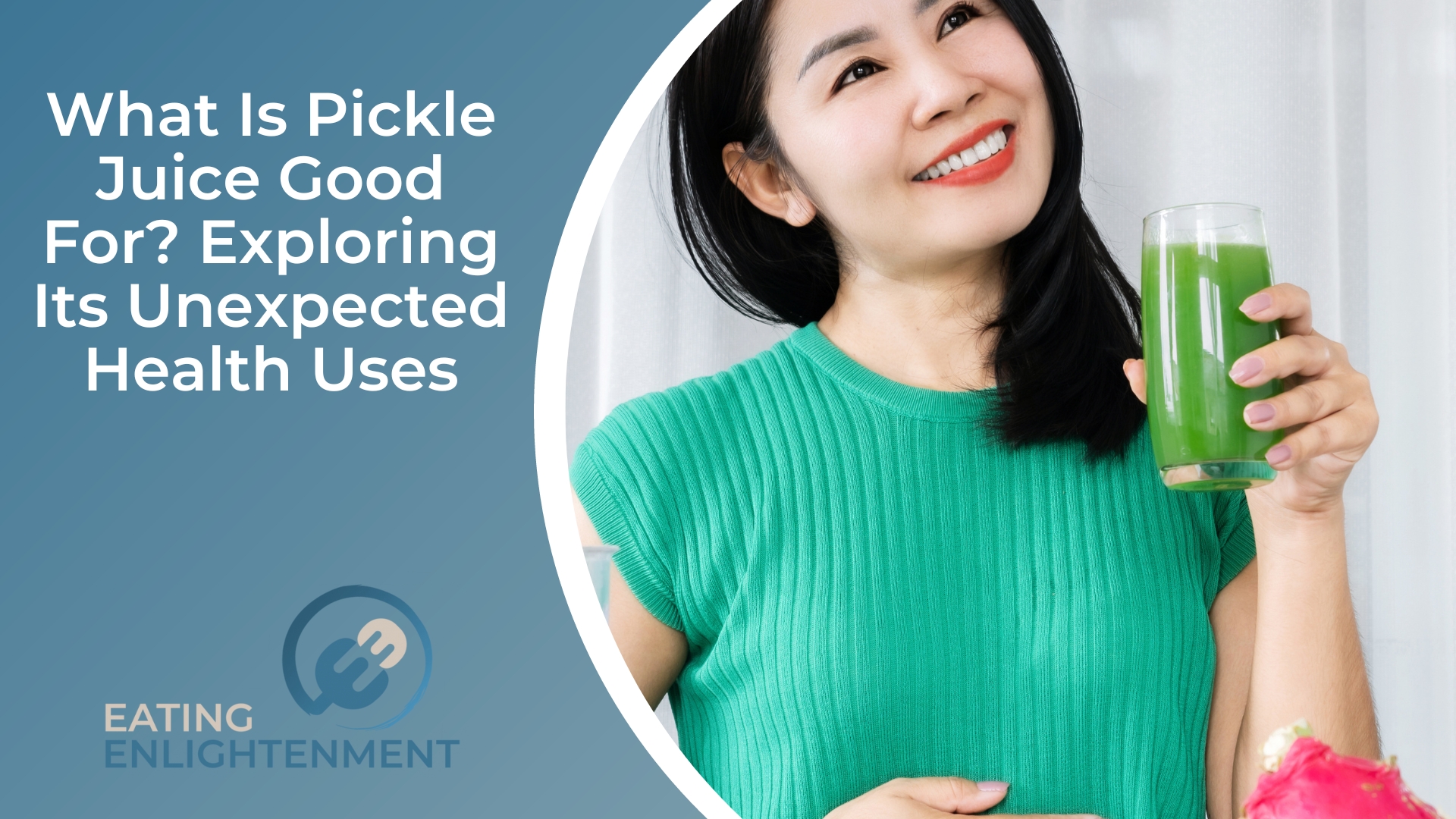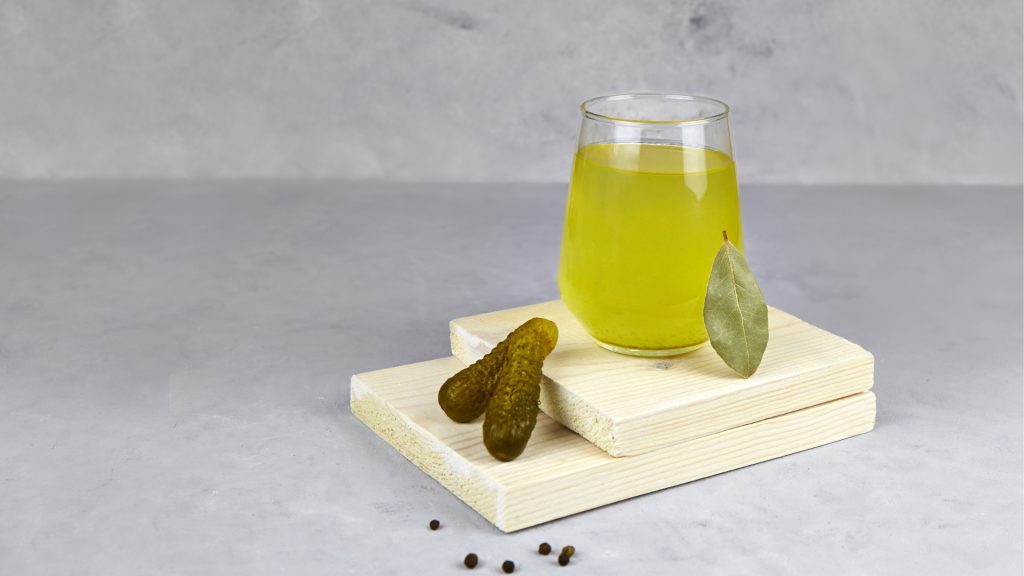Have you ever finished a jar of pickles and wondered, “What can I do with this leftover juice?” If so, you are not alone. Pickle juice, the often-overlooked byproduct of our beloved dill pickles, is far more than just a briny solution. It’s a hidden treasure trove of health benefits waiting to be unlocked.
Pickle juice is simply the solution used in pickling, a process that’s been around for some 4,000 years. It’s a mixture of water, vinegar, salt, and sometimes sugar, flavored with dill, garlic, and other spices. The result? A tangy, salty liquid packed with flavor – and, as we’ll discover, a surprising amount of health benefits.
From hydration to aiding digestion, pickle juice has been found to have a range of potential health uses.
You might be surprised to learn that athletes swear by it to prevent muscle cramps, thanks to its high sodium content. Did you know that pickle juice also contains antioxidants, which can help protect your body against damage from harmful molecules called free radicals?
Join me on this exciting exploration of the unexpected health uses of pickle juice. Trust me, by the end of this article, you’ll be looking at the leftover juice in your pickle jar in a whole new light. So, are you ready to dive into the briny depths of pickle juice’s surprising health benefits? Let’s get started!
What Is Pickle Juice?
Pickle juice, have you ever wondered what it is? It’s not just a tangy, salty liquid that your pickles swim in. It’s a carefully crafted solution with a long history and surprising uses!
Pickle juice is the byproduct of the pickling process. This process has been preserving foods for thousands of years, dating back to around 2030 B.C. when cucumbers from India were pickled in the Tigris Valley. To prevent spoilage, the process involves soaking foods in an acidic liquid or saltwater brine.
Here’s a simple breakdown of what goes into pickle juice:
- Water: This is the main ingredient that acts as a carrier for all the other ingredients.
- Vinegar: Usually distilled white or apple cider vinegar is used. Vinegar gives pickles their sour taste and preserves them by preventing the growth of harmful bacteria.
- Salt: Salt is essential to pickling as it aids in preservation and adds flavor.
- Sugar (sometimes): Some recipes include sugar to balance out the sourness of the vinegar.
- Spices: Dill is the most common spice used in pickle juice, but garlic, peppercorns, mustard seeds, and even red pepper flakes can also be added.
So, next time you crunch into a pickle, remember that the juice it was soaking in is more than just a salty solution. It’s a testament to a culinary tradition that spans centuries and cultures. As we’ll explore later in this blog, it might also be the key to unlocking unexpected health benefits!
How To Incorporate Pickle Juice In Your Diet: A Step-By-Step Guide
So, you’ve heard about the health benefits of pickle juice, and you’re ready to try it. But how do you go about incorporating this tangy elixir into your diet? Don’t worry. We’ve got you covered!
First, let’s quickly recap why you might want to consider pickle juice. Packed with sodium, potassium, and magnesium electrolytes, pickle juice can help restore your body’s fluid balance. It has also been found to reduce blood sugar spikes when consumed at mealtimes and may even boost your digestion and immune function.
Here’s a simple step-by-step guide on how to start including pickle juice in your diet:
1. Start Small: If you’re new to pickle juice, start by sipping a small amount – about a tablespoon or two. This allows your body to adjust to the new addition.
2. Add it to Your Meals: You can use pickle juice as a salad dressing or marinade for meats. It adds a tangy flavor that can elevate your dishes.
3. Make Pickle Juice Popsicles: This is a fun and refreshing way to enjoy pickle juice, especially during warm weather.
4. Drink After Workouts: Many athletes swear by drinking pickle juice post-workout to replenish electrolytes and reduce muscle cramps.
5. Use as a Hangover Cure: Some people find pickle juice can help ease hangover symptoms thanks to its high electrolyte content.
Remember, while pickle juice has many potential benefits, it’s also high in sodium, so moderation is key. As always, talk to your healthcare provider if you have any concerns or are considering making major changes to your diet.
Answers To Common Questions About Pickle Juice
Pickle juice is more than just a tangy liquid leftover from pickling cucumbers. It’s packed with electrolytes, probiotics, and nutrients that can offer some surprising health benefits.
But, understandably, you might have some questions. Let’s address the most common ones.
1. What are the health benefits of pickle juice?
Pickle juice is rich in electrolytes like sodium, potassium, and magnesium, which can help restore the body’s fluid balance. Some research suggests it may reduce muscle cramps, lower blood sugar spikes, and even boost digestion and immune function.
2. Can everyone consume pickle juice?
While many people can enjoy the benefits of pickle juice, those with high blood pressure or kidney disease should be cautious due to its high sodium content.
3. How much pickle juice should I drink?
If you’re new to pickle juice, start small – a tablespoon or two to see how your body reacts. Then, you can gradually increase the amount if you wish to.
4. Can I use pickle juice in my meals?
Absolutely! Pickle juice can be used as a salad dressing, marinade for meats, or even in your favorite cocktails for an added tang.
5. Is all pickle juice the same?
No, the nutritional content can vary based on the pickling process. Naturally fermented pickles made without vinegar can have more probiotics.
Remember, while pickle juice has potential benefits, moderation is key due to its high sodium content.
Conclusion
In conclusion, the humble pickle juice, often discarded without a second thought, is a hidden gem of health benefits. From its impressive hydration capabilities, high sodium content, and ability to aid digestion and ward off muscle cramps, pickle juice is a powerhouse of health benefits.
Throughout this article, we’ve discovered that what was once considered a byproduct of the pickling process is a potent health tonic. Its tangy, salty flavor is not just for tickling your taste buds but also serves a crucial role in maintaining your body’s balance, particularly for athletes and those leading an active lifestyle.
But does it truly work? The answer is a resounding yes. Studies and countless first-hand accounts attest to the efficacy of pickle juice in combating dehydration, easing muscle cramps, and providing a quick antioxidant boost. However, as with anything, moderation is key. While pickle juice is beneficial, overconsumption can lead to excess sodium intake.
So next time you finish off a jar of pickles, don’t be so quick to pour that leftover juice down the drain. You might just be letting a good dose of health benefits go to waste. So why not give it a try? Your body might thank you for it.
Remember, sometimes the best remedies are found in the most unexpected places – even in a jar of pickles.





